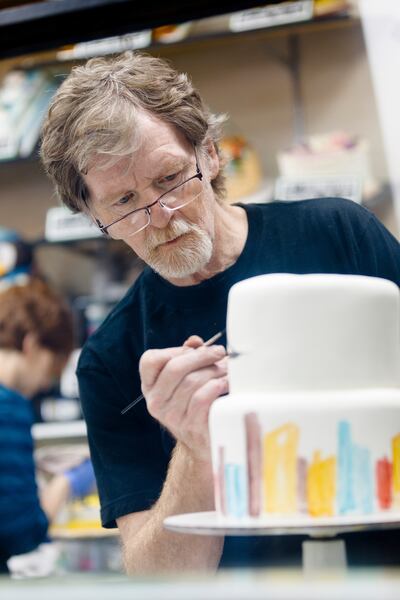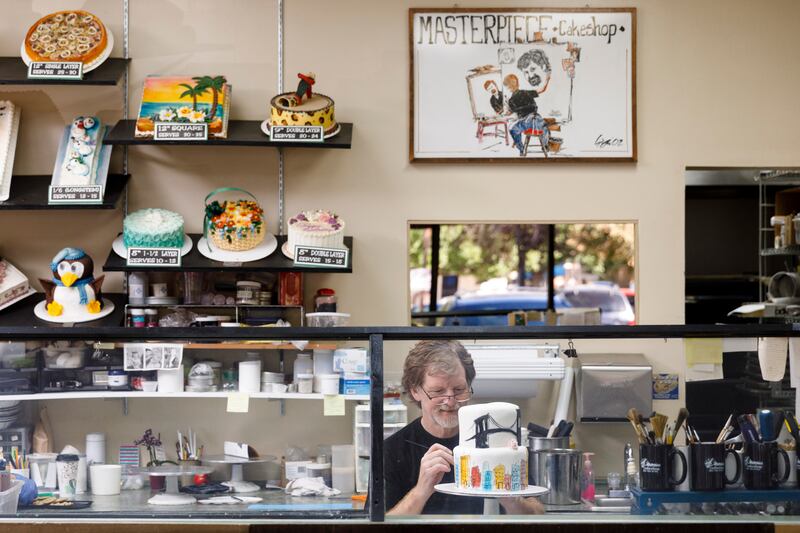SALT LAKE CITY — The Supreme Court on Monday ruled 7-2 in favor of a Christian baker in its high-profile wedding cake case, deciding the state of Colorado failed to respect the baker's religious exercise rights.
"When the Colorado Civil Rights Commission considered this case, it did not do so with the religious neutrality that the Constitution requires," Justice Anthony Kennedy wrote in the majority opinion.
Kristen Waggoner, who argued on behalf of the baker before the Supreme Court, said in a press call that the ruling highlights the need for tolerance and respect.
"The court's decision today makes very clear that the government must respect (cake baker) Jack Phillips' beliefs about marriage," said Waggoner, senior vice president of the U.S. legal division for Alliance Defending Freedom. The justices "held that religious hostility has no place in our pluralistic society."
The ruling in Masterpiece Cakeshop, Ltd. v. Colorado Civil Rights Commission was narrow in scope. It focuses on the actions of the commission rather than the larger question of whether religious objectors to same-sex marriage should be exempted from LGBT nondiscrimination laws and allowed to refuse service to gay or lesbian customers.

"Colorado can treat a baker who discriminates based on sexual orientation differently from a baker who does not discriminate on that or any other prohibited ground. But only, as the court rightly says, if the state's decisions are not infected by religious hostility or bias," wrote Justice Elena Kagan in her concurring opinion, which was joined by Justice Stephen Breyer.
Justice Ruth Bader Ginsburg wrote a dissent, which Justice Sonia Sotomayor joined, arguing that the majority opinion wrongly ignores the broader legal context surrounding the case that supports Colorado's actions.
"I see no reason why the comments of one or two commissioners should be taken to overcome Phillips' refusal to sell a wedding cake" to the gay couple, Ginsburg wrote.
Although the gay couple who filed the complaint against Phillips, Charlie Craig and David Mullins, are disappointed by the Supreme Court's decision, this ruling is far from the final word on religious service refusals, said James Esseks of the American Civil Liberties Union, the organization that represented the couple, on a press call.
"The ruling was based on facts that are entirely specific to this particular case," said Esseks, who directs the American Civil Liberties Union's LGBT and HIV Project. "This decision should provide cold comfort for anyone arguing for a broader exemption" from nondiscrimination laws.
The Supreme Court may take up another service refusals case as soon as this month, which would give the justices the opportunity to answer the bigger questions at the heart of the Masterpiece Cakeshop lawsuit, Waggoner said.
"We expect that the court will eventually have to grapple with these issues," she said.
Religious hostility
The Masterpiece Cakeshop case originated in July 2012, when Mullins and Craig visited the bakery with Craig’s mother, Debbie Munn. The group met with Phillips about ordering a cake for an upcoming celebration of their marriage. Phillips said his Christian faith prevented him from providing a cake for a same-sex wedding.
Mullins and Craig filed a complaint with the Colorado Civil Rights Commission, because Colorado law prevents discrimination based on sexual orientation. An administrative law judge, the commission and the Colorado Court of Appeals ruled in the couple’s favor, so Phillips appealed to the U.S. Supreme Court.
Many legal analysts expected the Supreme Court to rule on whether cake decoration is a form of protected speech or if religious objectors to same-sex marriage should be exempt from LGBT nondiscrimination law.
Instead, the ruling centers on the behavior of the Colorado Civil Rights Commission. Kennedy criticized commissioners for treating religious objectors to same-sex marriage differently than other business owners, noting that one commissioner compared Phillips' arguments to defenses of slavery and the Holocaust.
"This sentiment is inappropriate for a commission charged with the solemn responsibility of fair and neutral enforcement of Colorado's anti-discrimination law — a law that protects discrimination on the basis of religion as well as sexual orientation," he wrote.

Waggoner described the ruling as a reminder that the government cannot tip the legal scales against people of faith.
"The government cannot treat people of faith in a second-class way," she said. This ruling is a "strong statement about religious hostility, that it has no place in our society."
The ACLU's Esseks agreed that government agencies need to be respectful of religious beliefs moving forward.
"I see this as a reminder to government agencies and civil rights commissions that religion is important in our society … and that they need to be careful about how they talk about these issues," he said.
The Supreme Court's decision reaffirms a sentiment shared in its June 2015 ruling legalizing same-sex marriage. Then, as now, the justices emphasized the need for civility when people's opinions on marriage differ.
"There is room enough in our society for a diversity of viewpoints, and that includes respecting religious beliefs, too. The decision is a strong message to governments across the country that they must respect — rather than punish — religious diversity on important issues," said Mark Rienzi, president of the Becket Fund for Religious Liberty, in a statement about the Masterpiece Cakeshop case.
Similarly, Sen. Orrin Hatch, R-Utah, said in a statement that the government cannot attack someone because of his or her sincerely held beliefs.
"I applaud today's decision. Hostility toward religion has no place in government. At the same time, religious freedom means much more than freedom from government hostility. Courts must protect the ability of believers to freely live their faith and to express their religious beliefs openly and honestly," he said.
Eric Hawkins, a spokesman for The Church of Jesus Christ of Latter-day Saints, said the church welcomes efforts to balance religious freedom and LGBT nondiscrimination protections.
"The Church of Jesus Christ of Latter-day Saints welcomes today's Supreme Court decision. The nation's laws can protect both religious liberty and the rights of LGBT citizens. That is the meaning of fairness for all," he said.
No insights on free speech
The Masterpiece Cakeshop case was closely followed by faith groups, small-business owners, legal scholars and LGBT rights advocates, who all have a stake in efforts to balance religious freedom and nondiscrimination protections.
For the baker’s supporters, the case was about finding a way to respect conflicting beliefs about marriage. For those rallying behind Craig and Mullins, it was about ensuring fair treatment for the LGBT community.
But Monday's ruling left questions of balancing constitutional and civil rights unanswered. The majority opinion did not explain whether business owners like Phillips have a right to turn away members of the LGBT community or if expressive acts like cake decoration or flower arrangement are protected by the First Amendment's free speech clause.
"I think that the court said … the hostility was so open and obvious that it didn't need to (rule on) the issues related to whether Jack's cakes" are a form of speech, Waggoner said. "It left that question open for another day."
During oral arguments on Dec. 5, the justices showed through their questions for Frederick Yarger, Colorado's solicitor general, that this outcome was possible.
"Suppose we thought there was a significant aspect of hostility to a religion in this case. Could your judgment stand?" Kennedy asked.
However, the discussion also covered a variety of other topics, including how to set limits on which business owners to exempt from LGBT nondiscrimination laws.
"Obviously we want some kind of distinction that will not undermine every civil rights law," Breyer said at the time.
The Masterpiece Cakeshop ruling does not offer this distinction. The majority opinion emphasizes LGBT Americans' right to be treated fairly.
"Our society has come to the recognition that gay persons and gay couples cannot be treated as social outcasts or as inferior in dignity and worth. For that reason the laws and the Constitution can, and in some instances must, protect them in the exercise of their civil rights," Kennedy wrote.
Like Breyer, Kennedy expressed concern about how difficult it would be to create broader exemptions to LGBT nondiscrimination laws.
"When it comes to weddings, it can be assumed that a member of the clergy who objects to gay marriage on moral and religious grounds could not be compelled to perform the ceremony without denial of his or her right to the free exercise of religion," he wrote. "Yet if that exception were not confined, then a long list of persons who provide goods and services for marriages and weddings might refuse to do so for gay persons, thus resulting in a community-wide stigma."
Comments like these make Esseks feel hopeful about the future.
"I think the bakery got a get-out-of-jail-free card because of what the court thought of as misbehavior by the Civil Rights Commission," he said.
What's next
Dozens of lawsuits related to religious service refusals are moving through the court system right now. The Supreme Court could take up one such case, Arlene's Flowers v. State of Washington, as soon as later this month.
The Masterpiece Cakeshop ruling matters for these cases if they also involve religious hostility, Waggoner said.
"If there is any hint of hostility, we expect they'll be decided in the same way as (the Supreme Court) decided Jack's case," she said. Alliance Defending Freedom also represents Barronelle Stutzman, the owner of Arlene's Flowers, who was sued for illegal discrimination when she refused to provide flowers for a same-sex wedding.
In the majority opinion, Kennedy urges balance and respect in the adjudication of related cases.
"The outcome of cases like this in other circumstances must await further elaboration in the courts, all in the context of recognizing that these disputes must be resolved with tolerance, without undue disrespect to sincere religious beliefs and without subjecting gay persons to indignities when they seek goods and services in an open market," he wrote.
His comments remind anyone involved in religious service refusal cases to be sensitive to sincerely held beliefs on both sides of the issue, said Holly Hollman, general counsel of the Baptist Joint Committee for Religious Liberty, in a statement.
"As we consider these difficult issues in future cases, we all will fare better when we acknowledge the legitimate interests on both sides of these disputes and approach each other with civility and respect," she said.
Waggoner said she's not yet sure when Phillips will begin selling wedding cakes again. That part of his business had been put on hold by the lawsuit.
"We need some time to process that with him," she said.
Esseks does not expect the Colorado Civil Rights Commission to rehear the case related to the original complaint. However, he thinks the Supreme Court's ruling leaves room for future lawsuits.
"If a new same-sex couple walks into this business, I see no reason in this opinion that Masterpiece Cakeshop would be free to turn them away," he said.
Craig and Mullins, the couple who has asked Phillips to make them their wedding cake, said in a statement that they're prepared to continue their fight against religious service refusals.
"Today's decision means our fight against discrimination and unfair treatment will continue. We have always believed that in America, you should not be turned away from a business open to the public because of who you are. We brought this case because no one should have to face the shame, embarrassment and humiliation of being told 'we don't serve your kind here' that we faced, and we will continue fighting until no one does," they said.


